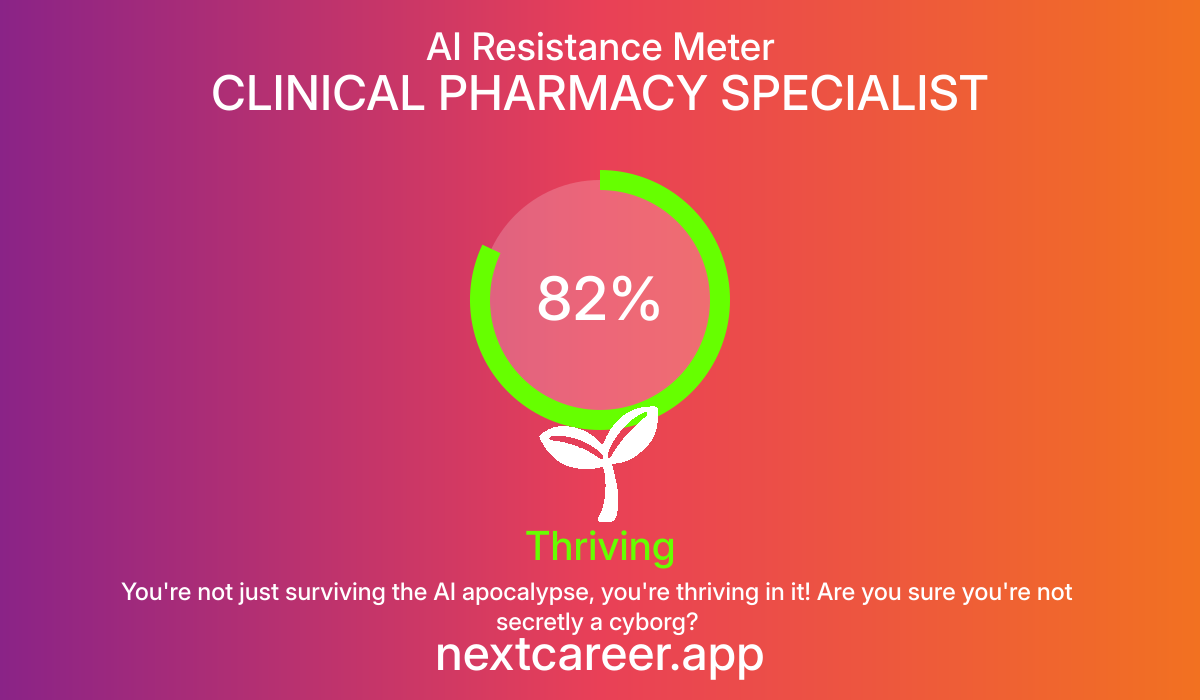AI Resistance for CLINICAL PHARMACY SPECIALIST
AI Resistance Score
AI Resistance Meter
Thriving
CLINICAL PHARMACY SPECIALIST
You're not just surviving the AI apocalypse, you're thriving in it! Are you sure you're not secretly a cyborg?
Clinical Pharmacy Specialists play a vital role in patient care by optimizing medication use, requiring both medical expertise and strong communication skills. They function at the intersection of healthcare and pharmaceuticals, where personalized patient interaction and clinical judgment are essential, making the role relatively AI-resistant. The job involves complex decision-making, interpreting nuanced clinical scenarios, and empathic communication, areas where AI remains limited despite rapid technological progress. However, with AI advancements in data analysis and diagnostics, some tasks like medication management could be enhanced or partially automated, but the critical role of human oversight and empathy in patient interactions maintains high AI resistance.
Clinical Pharmacy Specialists play a vital role in patient care by optimizing medication use, requiring both medical expertise and strong communication skills. They function at the intersection of healthcare and pharmaceuticals, where personalized patient interaction and clinical judgment are essential, making the role relatively AI-resistant. The job involves complex decision-making, interpreting nuanced clinical scenarios, and empathic communication, areas where AI remains limited despite rapid technological progress. However, with AI advancements in data analysis and diagnostics, some tasks like medication management could be enhanced or partially automated, but the critical role of human oversight and empathy in patient interactions maintains high AI resistance.
Key Factors
- Cognitive Tasks: AI's ability to process vast amounts of biomedical data can assist specialists but not replace their nuanced clinical judgment.
- Emotional Intelligence: The human touch in assessing patient needs and preferences remains irreplaceable by AI.
- Physical Skills: No significant physical tasks in this role are vulnerable to AI replacement.
- Creative Thinking: Creative problem-solving in optimizing patient care and medication plans is a strong human advantage over AI.
Human Advantages
- Empathic communication with patients and healthcare teams
- Clinical judgment and personalized care
- Adaptability to individual patient needs
AI Vulnerabilities
- Data analysis for medication interactions
- Predictive analytics for patient outcomes
Recommended Actions
- Stay updated with AI advancements in healthcare to leverage new tools.
- Focus on continuing education in clinical decision-making and patient communication.
- Develop expertise in interpreting AI-generated data to enhance clinical outcomes.
- Advocate for and participate in the development of AI tools that prioritize human-AI collaboration.
In the near-term (5 years), AI will continue to support Clinical Pharmacy Specialists by providing enhanced data analysis tools, improving efficiency in managing and tracking patient medication plans. Over the long-term (20+ years), while AI systems might advance in terms of predictive accuracy and data management, the inherently human skills of empathy, nuanced clinical decision-making, and ethical considerations will preserve the core demands of this role. The role might evolve to focus even more on human-centric tasks and the integration of AI tools into everyday practice.
